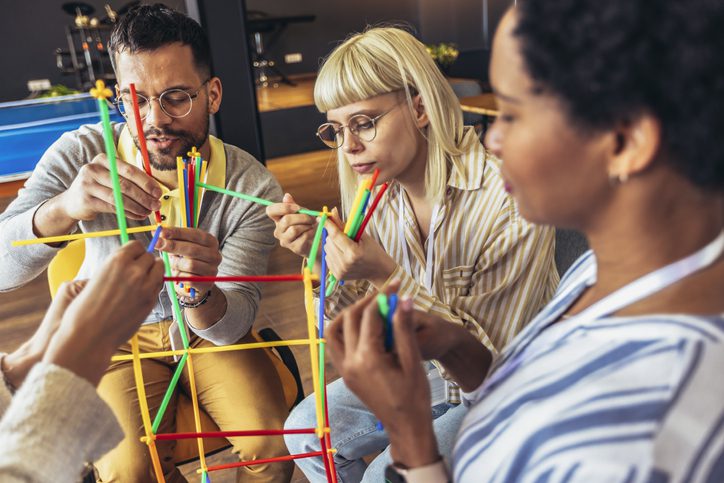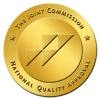Recreation – “activity done for enjoyment when one is not working”
Therapy – “treatment intended to relieve or heal a disorder”
If you can’t decide whether recreational therapy sounds like fun or work, we understand. At Eagle View Behavioral Health, we use recreational therapy to help clients relax and enjoy themselves while also improving their mental, emotional, and social health. To an observer, recreational therapy may look like people playing games or engaging in a fun activity, but the fun and games have a dual purpose.
When guided by a certified recreational therapist, these activities encourage clients to express themselves and show their vulnerability in ways that may feel safer than engaging in individual or group talk therapy.
What is Recreational Therapy?
According to the National Council for Recreation Therapy Certification, recreational therapy uses a variety of techniques that can include arts and crafts, sports, games, movement, drama, music, animals, and community outings:
Recreational therapists treat and help maintain the physical, mental, and emotional well-being of their clients by seeking to reduce depression, stress, and anxiety; recover basic motor functioning and reasoning abilities; build confidence; and socialize effectively.
While recreational therapy can be used to help people learn how to overcome or better manage physical disabilities, here at Eagle View we use recreational therapy to focus on helping our clients with psychiatric disorders gain functionality. Recreational therapy helps ease symptoms of depression and anxiety and helps clients build the confidence they need to engage with others.
As you can probably tell, recreation therapists are not simply people who organize group activities. They are professionals trained in designing activities for their clients’ specific needs to help them to overcome setbacks or blocks in their mental and emotional health.
What are the Benefits of Recreational Therapy?
The American Therapeutic Recreation Association lists many benefits of recreational therapy, including the following:
- Gives clients transferable skills, allowing them to apply what they learn in therapy to their home and community settings
- Is cost-effective, as treatment can happen in groups
- Addresses the whole person, focusing on helping a person independently care for their own physical, social, cognitive and emotional health
- Trains clients to find community resources that they can continue to use after formal treatment ends
- Teaches clients skills they can use in their everyday lives to enhance their overall quality of life
In addition, recreational therapy improves symptoms of depression and anxiety, increases self-esteem, helps people feel socially connected, and enhances cognitive abilities.
How Does Recreational Therapy Work? Some Examples…
One form of recreational therapy is art therapy. This story from the story library of the American Art Therapy Association shows how art can be used to help clients express what they are unable or unwilling to articulate in words. In this case, the therapist is working with an eleven-year-old boy who threatened to shoot a classmate:
I had him draw a picture of his anger, and he drew what you might expect: a stick figure boy pointing a gun at a stick figure girl. As we talked about the consequences of his desired actions, and then brainstormed alternative solutions, Evan calmed down and began to see reason. […] I encouraged him to go back to his original drawing and change it to reflect his calmer, more positive state. He drew over some elements, changing the gun to a bouquet of flowers, and spurts of blood to hearts. He looked up and abashedly admitted, “I have anger issues.” In less than an hour, this client had moved from homicidal ideation to literally changing his view of the situation. All through the power of art therapy.
Creative writing, music, drama, games, sports, and dance/movement all have similar abilities to help clients express difficult feelings and work through them. Recreational therapy activities like games or sports that take place in a group setting help clients connect with each other and gain practice communicating, working together, and resolving differences.
Brooke Scholl, a recreational therapist at a hospital in California, helps her clients practice social skills and boost their mood through activities like karaoke, jewelry making, and video game bowling. “I’ll never forget the time a patient came up to me after a group, and with tears in her eyes, thanked me for showing her how to have fun again,” says Scholl. “It was a moment I continue to cherish.”
If you or a loved one is struggling with a mental health diagnosis, Eagle View Behavioral Health in Bettendorf, IA, can help. We serve adolescents and adults through both inpatient and outpatient care. Our robust treatment program includes individual and group therapy as well as recreational therapy. We know that recovering from a mental health disorder does not feel like much fun at all, but we can assure you that your time spent here at Eagle View will give you hope for the future–and all the fun it holds.






